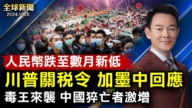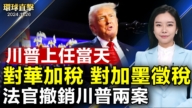【新唐人2013年07月06日讯】埃及民选总统穆尔西(Mohamed Morsi)日前遭军方罢黜,临时总统曼苏尔(Adli Mansour)宣誓就职。埃及发生的政变引起中共的高度关注,也引发大陆网友对“民主”和“革命”的讨论。但是,中共喉舌媒体与网友们做出了截然不同的反应。
《美国之音》认为,埃及的政变过程和形势的微妙性,显然对中共构成了多重的难题。因为从许多方面来说,都是中共不愿加以解说的。
埃及前独裁统治者穆巴拉克是中共的老朋友。虽然两年前,北京明确表示支持穆巴拉克,但还是难挡穆巴拉克被抗议者赶下台的结局。
随后,埃及举行了民主选举,选出了穆尔西总统。穆尔西上台后采取的一些高压行动,使得他在一年后立刻被罢免。
7月4号,针对埃及局势中共喉舌《人民日报》旗下的《国际金融报》发表文章,内容引述一名所谓社会主义激进份子的话说:“军队重回政治舞台中心将是噩梦般的一幕。”
《环球时报》则说:“从阿拉伯之春到阿拉伯噩梦,埃及混乱局面加剧。”
而中共另一喉舌《新华网》也发表题为“埃及局势动荡挖了西方民主墙角”的网评。和《人民日报》、《文汇报》等喉舌相似,主要批评西式民主、民主输出等。
5号《 人民日报》海外版还发表了“埃及兜头浇了‘阿拉伯之春’一瓢凉水”。
旅美中国民运人士沈源:“这完全是五毛的说法,维护共产党专制统治的论调,这种论调实际上已经被全中国人民,可以说是已经抛弃了。是非常苍白的。”
电子书《变局策》作者李一平表示,任何一个国家,由专制社会过渡到民主社会,都需要一个过程。
电子书《变局策》作者李一平:“推翻专制政权,这个很快,埃及用了7天,但是要建立民主社会,肯定是要有比较长的过程。比如说台湾,当年从威权社会过渡到现在的民主社会,也不是一蹴而就,也是用了将近20年的时间。台湾刚刚实行民主制度的时候,中共政权和御用文人,也写了很多文章,做了很多评论,抱着看笑话的心态。但是现在,再也没人敢说、拿台湾看笑话了。”
相比之下,《央视》特约评论员杨禹在微博上的评论,则更加直截了当。他说,西式民主需两个前提:一是经济自由。二是全民守规则。“在一个连过马路不闯红灯都还没成为习惯的社会里,民主规则亦可随时被推翻。”杨禹的评论表面说的是埃及,但《美国之音》认为,杨禹显然是在说中国人素质差,不能或不配享受民主。
李一平:“如果是一个政权对自己的百姓抱着这样一种评价,一种态度,那这个政权本身就应当被推翻了。”
中国宪政学者陈永苗指出,一个宪政国家根本不会害怕政府的更换。
中国宪政学者 陈永苗:“就像日本一样。日本的首相一年就换一次。它银行是铁打的,社会是稳定的。所以我觉得所谓‘引起社会动荡’这些讲法,基本上是一种精神病。”
也有网友给出犀利的评论,笑称中共是自己光着屁股,还嘲笑别人穿的鞋怎么破了洞。
大陆媒体节目主持人胡紫微也在微博上大胆嘲讽中共媒体的态度。
她说:“埃及出事了。赶紧跑出来凑一嘴,骂一骂宪政。真有出息。您可以问问埃及人民,还想不想回到穆巴拉克的时代?……总以为讪笑别人癣疥之疾,就可以遮蔽自己溃烂之处。”
与此同时,在大陆网络上,祝福埃及、羡慕埃及、为埃及同胞祈福的声音随处可见。
陈永苗认为,现在埃及总体形势发展较好,军队起的是宪政守护者的作用,民众也不过是因为经济发展以及民生问题未解决,要求政权的更替。陈永苗相信,随着不断革命,埃及的民主化会越来越好。
采访/陈汉 编辑/王子琦 后制/孙宁
Chinese Officials and Citizens’ Two Attitudes towards Egypt’s Unrest
Egypt’s military has removed President
Mohammed Morsi from power.
On July 5, Adli Mansour was sworn in as interim president.
The Chinese Communist Party (CCP) has paid much
attention to the changes in Egypt.
“Democracy” and “revolution” has become
a hot topic among Chinese netizens.
However, responses from CCP media and
Chinese netizens are sharply different.
Voice of America (VOA) says the process and form of Egypt’s
coup are complex, and it’s obvious, the CCP feels pressured.
In many aspects, the CCP doesn’t want to talk about it.
Former Egypt dictator Hosni Mubarak
is an old friend of the CCP.
Two years ago, the Chinese regime clearly expressed
its support of Mubarak.
However, the CCP couldn’t prevent Mubarak
from being ousted by protesters.
Subsequently, Egypt held a democratic election,
and Morsi was elected as president.
After Morsi took office, he implemented some dictatorial
measures. A year later, he was overthrown.
On July 4, under the umbrella of People’s Daily, CCP media
International Finance News published an article.
It cited a so-called “socialist militant” as saying “It will be a
nightmare if the military returns to the political stage,
and the chaotic situation in Egypt could only be intensified.”
CCP media mouthpiece Xinhua Net says the state of Egypt’s
unrest has “dug a hole on the wall of western democracy”.
The same rhetoric was carried in reports by People’s Daily
and Wenweipo, criticizing western democracy.
On July 5, the overseas edition of People’s Daily said that
Egypt’s unrest has “poured cold water on the Arabic Spring”.
Shen Yuan, US-based Chinese democracy activist:
“This is fully a saying of China’s 50 cent party (WuMaoDang),
so as to maintain the CCP’s dictatorship.
This opinion actually has been abandoned
by the entire nation. It’s very weak.”
Li Yiping, author of the e-book “Strategy Towards Democracy”
says that any country transitioning from an authoritarian
society to democratic one needs a process.
Li Yiping: “An authoritarian regime can be overthrown
very quickly. It only took seven days in Egypt.
To establish a democratic society will certainly
require a long-term process.
For example, in Taiwan, the transition from an authoritarian
society to today’s democracy didn’t happen overnight.
It took nearly 20 years.
When Taiwan began this process, the CCP and its writers
published many propaganda articles and editorials.
The CCP held mentality to make a mock of it.
Now, however, the CCP dares not mock Taiwan anymore.”
Yang Yu, a commentator of China’s Central TV has been even
more direct in comments he posted on his weibo microblog.
Yang said Western-style democracy has two preconditions:
One is economic freedom;
the other is that the entire nation abide by the rules.
He said, “in a society, if it isn’t taken as common sense
to stop at a red light when driving in the street,
people may overthrow the rules of democracy at any time.”
On the surface, Yang Yu’s comment relates to Egypt, but
VOA says that Yang is obviously saying Chinese people are
of too poor quality to deserve to enjoy the democracy.
Li Yiping: “If a regime holds such attitude
toward its civilians, then the regime should be ousted.”
Chen Yongmiao, a Chinese constitutional scholar says that
a constitutional country would never be intimidated
by a change in government.
Chen Yongmiao: “Just look at Japan,
they change prime minister once a year.
Their banks are strong, and the society is stable.
I think this doctrine that says any change will cause so-called
‘social unrest’ is basically nonsense.”
Some netizens posted sharp comments.
One netizen said, “the CCP has it’s bare bottom showing,
yet it laughs at other people for having holes in their shoes.”
Hu Ziwei, a TV show host in Mainland China,
also boldly ridiculed the CCP media’s attitude.
She said on her Weibo: “Something happened in Egypt.
Someone took the chance to add their comments,
cursing at the constitutional system.
You should ask the Egyptians if they wish
to return to Mubarak era.
Someone always wants to ridicule others problems,
thinking that by doing so they can cover up their own.”
Meanwhile, messages like “bless Egypt”, “envying Egypt”
and “pray for the Egypt” are posted all over China’s internet.
Chen Yongmiao says that the current situation in Egypt is
going well, and the army safeguards the constitutional system.
Egyptians protest for changes in the government because of
the problems with their economic development and livelihood.
Chen says he believes Egypt’s democratization will only
continue to develop and improve.




























